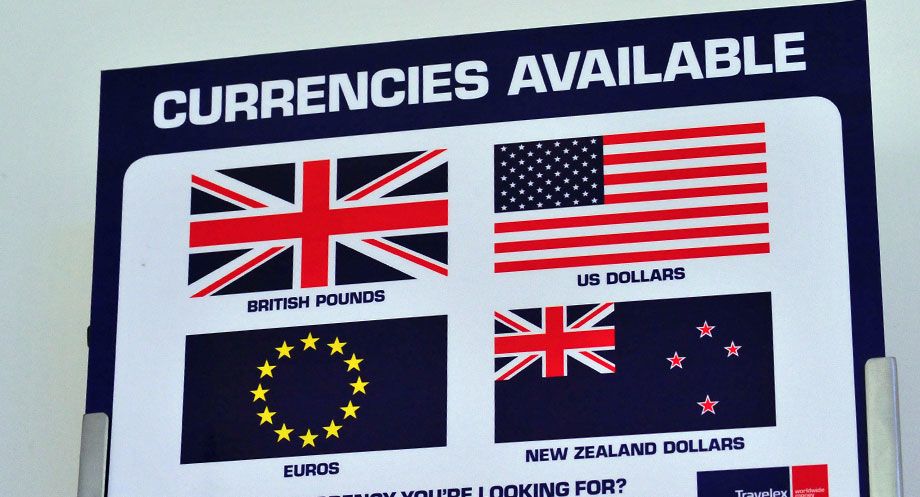Disclaimer
Executive Traveller may receive a commission when you apply for these credit cards via our links.
The information provided on this page is purely factual and general in nature. You should seek independent advice and consider your own personal circumstances before applying for any financial product.
Heading overseas and wondering what the most cost-effective way to take money with you is?
The most popular ways to do it are with your current credit/debit card in overseas ATMs, prepaid travel money cards, and foreign cash exchange, so we've analysed them to find which provides the best value.
Using your own Australian bank credit/ATM cards
When using your own bank's credit or ATM card, you benefit from having your money converted at the bank's wholesale exchange rate, rather than the rip-off rates you'll find if you walk up to a random foreign exchange booth.
However, the bank still makes money by charging a 3 - 3.5% profit margin on top of all foreign purchases (that's $30 - $35 on $1,000).
In terms of ATM cash withdrawals, normal Australian bank accounts and credit cards charge around 3% of the withdrawal amount plus $5 each time (for example, an $11 fee for a $200 withdrawal).
There are a few card type that are exceptions -- GE Finance has a credit card called 28 degrees Mastercard that charges no foreign exchange fees, and has free cash withdrawals at overseas ATMs. We've reviewed it extensively here.
NAB also has a bank account called NAB Gold Banking which provides a Visa Debit Card which similarly has no overseas ATM withdrawal fees. However, it has a $10 per month fee (waived if you deposit $5,000 per month into it).
One very important thing to be aware of when using your own ATM or credit card overseas is that foreign ATMs can charge very high fees for usage, and some countries don't require this to be disclosed before the transaction goes ahead.
For example, Australian Business Traveller staff have been hit by a $15 fee for a transaction at an English-language ATM in a five star hotel lobby in China. The ATM gave no warning of this.
Prepaid travel money cards
Prepaid travel money cards are a relatively new thing -- we've recently reviewed and explained them in-depth here, comparing the four main cards on the market from Commonwealth Bank, ANZ, American Express and Travelex.
They are designed for you to load money onto them before you head overseas, in the currency of the foreign country you're travelling to.
You can't escape paying a fee for the foreign exchange -- we found exchange rates are similar to what you get if you pre-book a currency exchange with Travelex at the airport (one of the cheaper ways to buy currency).
However, the upside of them is once you've loaded the foreign currency on the card, it isn't subject to exchange rate fluctuations, so in that way they're just like cash.
Also, travel money cards do not charge any surcharge for purchases made on the card -- as long as you spend in the right currency.
If you buy something in a currency other than the one you loaded on the card, you'll pay a conversion surcharge, but it is usually lower than the 3 - 3.5% charged on regular credit cards. For example, Commonwealth Bank only charges 2%. Travelex Cash Passport is an exception to this rule, though, slugging wrong currency purchases a whopping 8.45% penalty fee.
Preloaded travel money cards also do not charge a percentage surcharge if you withdraw the currency you've loaded onto the card, but they do charge a flat ATM withdrawal fee -- in the range of US$2.00 - US$3.75 for a US dollar withdrawal, for example. So they are a bit cheaper for withdrawing cash than standard Australian credit/ATM cards.
One inescapable gotcha that applies to both standard ATM and preloaded travel money cards is foreign ATM operator fees. This fee applies whether it's a travel money card or a standard ATM card used in the withdrawal, so the two are comparable on this point.
Travel money cards are roughly comparable to the exchange rate you get if you pre-book a cash exchange from Travelex.
However, they have the advantage of being able to be easily replaced if you lose them, whereas replacing cash will require a travel insurance claim (if the policy even covers it) which can take many weeks to process.
Travel money cards are generally issued in pairs so you can keep one in your wallet, and one in a hotel room safe. If the first one is stolen, it can be deactivated without deactivating the second card, which has a different card number and PIN number.
They also have the advantage of only having a limited amount of money on them. If your card is skimmed and used fraudulently elsewhere, the amount of money you will lose is limited to the amount you've loaded onto the card.
Foreign currency exchange
Cash has the obvious advantage of being accepted everywhere and without any additional fees at the time of purchase (you may even be able to negotiate a discount for cash!)
And, obviously, the big downside with cash is the risk of losing it, with very limited coverage for loss/theft of cash under most travel insurance policies, and a slow claims process.
Those basics aside, the trick with exchanging cash is to pre-arrange it online with a foreign exchange company. If you walk up to a retail bureau de change at the airport, you will more than likely be ripped off badly -- you can lose 10-15% of your money through bad exchange rates.
In our investigation of the cheapest currency exchange outlets in Australia earlier this year, we found that when buying £1000, the cost in Aussie dollars could be as little as $1696.65 (at Flight Centre Money Centre) or as much as $1916.00 (using the Travelex change booth at Sydney International Airport). That's a difference of almost $220!
Disclaimer
Executive Traveller may receive a commission when you apply for these credit cards via our links.
The information provided on this page is purely factual and general in nature. You should seek independent advice and consider your own personal circumstances before applying for any financial product.


Hi Guest, join in the discussion on Travel money and currency exchange money saving tips